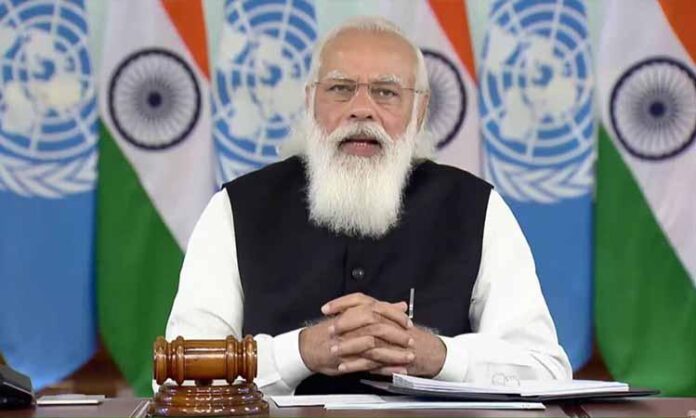(TibetanReview.net, Aug10’21) – In what is seen as a snide reference to China, Prime Minister Narendra Modi of India, addressing the UN Security Council as its President for the month of August, has said Aug 9 that maritime disputes should be resolved peacefully and as per international law. He has cited India’s maritime boundary settlement with Bangladesh as an example.
China has been claiming sovereignty over more than 90% of the South China Sea, carrying out aggressive patrolling and fishing activities, carrying out oil explorations while also building militarized artificial islands, brushing aside legitimate exclusive economic zone claims of many other countries. It has also been bullying East China Sea claims with similar extraterritorial claims based on false historical narratives.
In 2016, the Permanent Court of Arbitration (PCA) under UNCLOS (UN Convention on the Law of the Se) ruled that China’s activities in the South China Sea were illegal. But Beijing remained undeterred, leading to growing tensions. But on Aug 9, China submitted diplomatically to asserting the primacy of UNCLOS under severe international pressure, noted the timesofindia.com Aug 10.
A presidential statement was adopted at the end of the first standalone discussion on “maritime security” which flagged the “primacy of international law” — UN Convention on the Law of the Sea or UNCLOS is the legal framework applicable to activities in oceans, including countering illicit activities at sea.
China was the only P-5 member to hold out till the very end on the language related to the UNCLOS.
The final statement was quoted as saying: “The Security Council reaffirms that international law, as reflected in the United Nations Convention on the Law of the Sea of 10 December 1982 (UNCLOS), sets out the legal framework applicable to activities in the oceans, including countering illicit activities at sea.”
Modi has said in his remarks: “Maritime disputes should be resolved peacefully and in accordance with international law. This is extremely important for promoting mutual trust and confidence, and ensuring global peace and stability.”
He has also made a veiled reference to China’s Belt and Road Initiative, saying while creating structures for “maritime connectivity”, countries should keep “financial sustainability” and absorption capacity of the host countries — a clear reference to Beijing’s debt-trap diplomacy in recent years, noted the indianexpress.com Aug 10.
The session on “Enhancing maritime security: a case for international cooperation”, chaired by Modi, was attended by Russia President Vladimir Putin, US Secretary of State Antony Blinken, France Foreign Minister Jean-Yves Le Drian, UK Defence Secretary Ben Wallace and China’s Deputy Permanent Representative to the UN, Dai Bing, among others.
China expressed opposition to the situation in the South China sea being raised at the session, with Dai saying towards the end of the session, “Mr President, I wish to point out that the (UN) Security Council is not the right place to discuss the issue of South China Sea. The United States just mentioned the South China Sea issue, and China firmly opposes this act.”
But this did not stop French Minister Le Drian from saying: “We would like to remain extremely attentive to all these situations in over tensions in the South China seas. France is working in different regional fora to assist its partners to strengthen their ability to ensure the control and security of maritime bases.”






